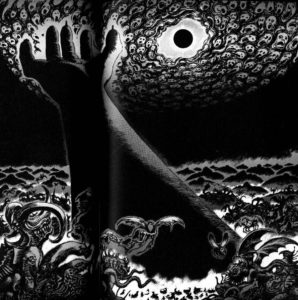The core of The Master of Ceremonies chapter involves three agendas and 11 principles, where agendas are the abstract goals of play and principles are means, or methods, that further the agendas. The three agendas apply 100% to OSR play (text of agendas from 2E, p. 80):
- Make Apocalypse World seem real
- Make the players’ characters’ lives not boring
- Play to find out what happens
If anything, the third agenda is the single most important aspect of open-ended, exploration focused play. Whether you are exploring a dungeon, crawling hexes, or even engaging in palace intrigue, the most rewarding OSR play for me starts with a setting backdrop, some situations in motion, some randomly determined events, and a sequence of player choices about what to investigate or ignore. Setting backdrop includes elements such as fictional locations and random encounter tables. Events include particular random encounters that happen, reaction rolls, and even the positive or negative outcomes of combats. Then, that mix determines fictional developments, alliances, and ultimately some form of emergent narrative. This requires some discipline, or at least trust that such juxtaposition will lead to engaging play. As Apocalypse World directs (2E, p. 80):
It’s not, for instance, your agenda to make the players lose, or to deny them what they want, or to punish them, or to control them, or to get them through your pre-planned storyline (DO NOT pre-plan a storyline, and I’m not fucking around).
The other two agendas are also central to OSR play for me. Make the world seem real means that when adventurers retreat from a dungeon, monsters may learn. The same tactics should work less well the second time. Intelligent denizens will remember being wronged—or helped. Retainers will betray characters if poorly treated (with appropriate foreshadowing or communication between referee and players, of course). Developments occur offscreen, especially regarding threats telegraphed but ignored, such as unchecked goblin raiding leading to food shortages. And so forth. Making the world seem real drives adventures and makes player choices matter.
I can see the objection already: all this is just common sense, there is nothing specifically OSR about this approach to refereeing; there may not even be anything specific to Apocalypse World. But I disagree. These agendas do not apply to all games. If you are playing a Pathfinder Adventure Path, the game—the place where player choices matter—is not so much in playing to find out what happens. Instead, the game challenges player skill in crafting effective builds and in tactical battlefield teamwork. There exist other reasonable high level goals of play which diverge from these agendas as well. For example, there are some RPGs where maintaining the sense of a world in motion outside of the player characters is less important. In those games, the equivalent to make Apocalypse World seem real is less applicable.
The question then becomes, are there other abstract, high level goals of OSR play apart from these three agendas, or do these three agendas suffice? I think there are two potential candidates. The first involves exploration and the gradual discovery or revelation of wondrous landscapes. Attack ships on fire off the shoulder of Orion. The inky expanse of an underground sea. The second involves navigating fictional challenges using creative problem solving and teamwork. The first potentially falls under playing to find out what happens and making the world seem real, though I can imagine a satisfying game of Apocalypse World never leaving, for example, a refugee camp. So even though some of the principles, which I will discuss in later posts, may naturally fit with exploratory play, the agendas do not in and of themselves demand exploration. The second also probably deserves a separate agenda statement, if one were to write the OSR referee equivalent of the MC chapter.
One final note. So far I have mostly been discussing the applicability of Apocalypse World methods structurally rather than in terms of content. Much of the fictional content presented by Apocalypse World may be absent from OSR settings, such as guns, vague memories of our present world, cigarettes, napalm, and so forth. That said, D&D is the apocalypse. A points of light setting, which describes many D&D settings, where danger and adventure surround small areas of safety, would be the natural outcome of life after an apocalypse. Examples of stories in other media that feel most D&D to me are often post-apocalyptic or post-apocalyptic adjacent, such as The Walking Dead, early episodes of Lost, the Blame! anime, Vance’s Dying Earth stories, Berserk after the Advent, The Book of the New Sun, and all the Dark Souls video games. So while the cosmetic details might vary if your setting includes elves, knights, longbows, or riding velociraptors rather than bikers, automatic weapons, and Fury Road battle cars, there may be more similarities than differences once you get past the surface associations.


Hi, thanks for sharing, your blog very helpful to me. Your Blog is very Unique and Reliable.
https://www.superbdeveloper.com/